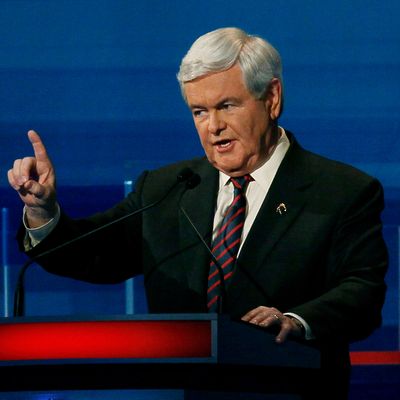
One of the more amusing developments in the Obamacare debate has been watching conservatives turn from denouncing the health-care law for its lack of high-deductible insurance to denouncing the health-care law for its high-deductible insurance. I wrote a bit about it a week ago, and Ezra Klein describes it in much more detail today. Insurance plans with low premiums and high deductibles were a major centerpiece of conservative health-care thinking. Until quite recently, conservatives seemed to believe that Obamacare prevented such plans from existing, which was totally false. As they’ve come into existence, conservatives have transitioned seamlessly into denouncing these plans for their horrible, high deductibles.
Episodes like this one have grown so familiar that they’ve lost all capacity to surprise. Conservative health-care-policy ideas reside in an uncertain state of quasi-existence. You can describe the policies in the abstract, sometimes even in detail, but any attempt to reproduce them in physical form will cause such proposals to disappear instantly. It’s not so much an issue of “hypocrisy,” as Klein frames it, as a deeper metaphysical question of whether conservative health-care policies actually exist.
The question should be posed to better-trained philosophical minds than my own. I would posit that conservative health-care policies do not exist in any real form. Call it the “Heritage Uncertainty Principle.”
I take the name of this principle from the emblematic example, the Heritage Foundation’s health-care plan, which formed the primary intellectual basis for conservative opposition to Democratic health-care plans. In 1993, Republican minority leader Bob Dole supported a version of it to demonstrate that Republicans did not endorse the status quo, until Democrats, facing the demise of their own plan, tried to bring up Dole’s plan, at which point Dole renounced his own plan.
During a Republican presidential debate two years ago, while Newt Gingrich assailed Mitt Romney for having previously supported an Obama-like health-care plan, fellow Republicans noted that Gingrich had done the same thing. Facing a threat to his own ideological bona fides, Gingrich issued this memorable defense for his long-renounced history of support for the individual mandate: “It’s now clear that the mandate, I think, is clearly unconstitutional. But, it started as a conservative effort to stop HillaryCare in the 1990s.”
This may be the most incisive expression of conservative health-care thinking ever uttered. In the first sentence, Gingrich asserts that the individual mandate is now clearly unconstitutional, even though its constitutionality was deemed not even remotely questionable before. And in the next breath, he casually admits that he had supported the plan as a mere tactic to stop Clinton. Of course he didn’t really want to implement it!
The Heritage Uncertainty Principle could likewise be seen at work throughout Obamacare’s torturous legislative path to enactment. Republicans had all kinds of health-care ideas they wanted to discuss. Oh, the ideas they had. Republican senators like Olympia Snowe and Charles Grassley flitted tantalizingly out of reach for months, always willing to keep talking, but never able to identify concrete terms that might win their vote. Ron Wyden convened a large, bipartisan group of senators happily discussing an alternative health-care plan to Obama’s, except that, when pressed, the Republican co-sponsors admitted that they didn’t really want to vote for the actual plan. They just liked the idea of a bipartisan plan that wasn’t Obama’s. Any attempt to turn these ideas into an actual law would cause them to disappear instantly.
As Obamacare comes online, Republican opposition increasingly has to take the form of proposals to change the post-Obamacare system, not just opportunistic complaints about everything that happens. Or does it? A recent Wall Street Journal story reports that Republican policy-makers are beginning to question their proposals, which would disrupt the employer-based system. “I’ve come to the conclusion that it would be much better to try and thread the needle and not disrupt the vast number — millions and millions of Americans — who are in more or less stable employer insurance today,” says conservative health-care analyst and Paul Ryan adviser James C. Capretta. Republicans who think about health care are constantly coming to new conclusions, which is to say, their conclusions are anything but.






























